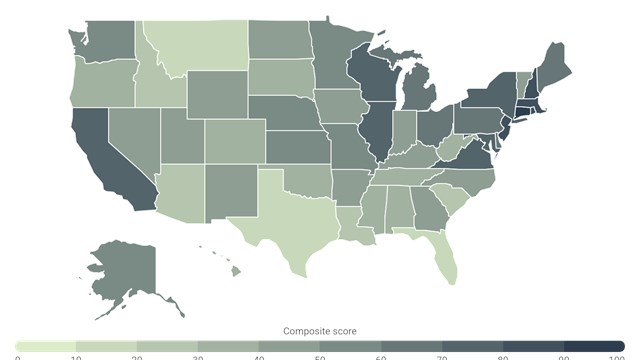Should local banks be allowed to become actively involved in the real estate brokerage business? Specifically, should they have an administrative hand in the sale and management of units in co-ops and condos?
These questions are currently hot points of discussion among leaders in the real estate and banking industries. Proponents on both sides of the issue are speaking out, expressing strong opinions both for and against the status quo, which is itself presently being challenged by a proposal under serious consideration by the Federal Reserve Board and Treasury Department. The proposed bill would allow federally chartered banks to engage in real estate brokerage and property management activities.
The official deadline for public remarks on this issue was May 1, 2001. However, consumer comments are still being received and considered by the board. It will probably take several more weeks or months for all the responses to be evaluated and decisions made.
According to James McLaughlin of the American Bankers Association (ABA), some 40,000 comments have been received by involved agencies to date. Many of those comments have been submitted by real estate brokers as part of an anti-bank campaign orchestrated by the National Association of Realtors (NAR). In addition to sending letters, faxes, and e-mails, about 7,500 Realtors descended upon Washington in May to canvass Capitol Hill with a message for lawmakers to "Stop the Big Grab."
While the Fed deliberates, the arguments from both banking and brokering industries rage on. The easiest way to decipher the debate is perhaps to examine each camp individually.
The Brokers’ View
In a white paper issued in May 2001, the National Association of Realtors (NAM), stated, "Consumers would pay the price in higher home buying costs, less choice in real estate services and higher banking fees if banks start real estate brokerage operations." The paper also noted "the regulation would not lead to improved banking industry profits or performance." Richard Mendenhall, president of NAR, elaborates: "If this regulation is adopted, several large financial service holding companies will quickly dominate our [brokerage] industry by buying up brokerage firms or driving others out of business. In a short time, through sheer market power, a few huge banks could control a significant portion of the real estate brokerage, relocation and management businesses and change our industry for the worse," he said. "Bank-controlled real estate firms will become marketing arms of mortgage departments and other services banks sell. They will be more interested in making a loan or selling mortgage insurance than helping a buyer find the best deal."
Mendenhall claims that there’s no need to introduce such a far-reaching change to the real estate brokerage industry. "Our real estate industry is the envy of the world and has been a major contributor to our record national homeownership rate," he says. "Our brokerage field is highly competitive and efficiently structured to provide a high level of personal service to property buyers and sellers. Should this regulation take effect, consumers would be the real losers. Real estate brokers’ loyalty is to property buyers and sellers. Their success depends on the quality of service they provide their customers. On the other hand, a bank’s expertise and vested interest lies in making loans, not providing real estate services."
A recent survey of 800 adults conducted by the Public Opinion Strategies polling service revealed that nearly two out of three consumers believe that in order to protect their interests, this regulation should not be approved.
The survey found that 68 percent of consumers believe they would be hurt because bank-owned real estate brokerage operations would have access to all homebuyers’ and sellers’ bank accounts and personal financial information. About 58 percent of respondents said they believe banks are too powerful already and should not be allowed to own real estate brokerage operations.
"When it comes to service for a family making its most expensive purchase, who is the better advocate–a salaried employee whose firm makes more from selling a loan than selling a house, or an independent broker working on commission who won’t get paid until the deed is finalized to the customer’s satisfaction?" Mendenhall asks.
According to Daryl Jesperson, president of the RE/Max International real estate franchise group, "It’s my firm belief that the banking industry does not have a full understanding of what’s required to be successful in the real estate industry. The grass always looks greener on the other side of the fence. It’s only after you’re on the other side that you realize that the lawn needs mowing, trimming, watering, weeding and fertilizing.
"I’m concerned that those favoring the proposed rule are focusing on the commission line of the real estate closing statement. That can be a very misleading number. A well-run brokerage firm averages about $150 per month pre-tax net income per agent. That commission structure leaves a very small amount to pay overhead and have something left for profit."
Gary Thomas, president of the California Association of Realtors (CAR), argues that "consumers would be hurt by diminished choices when buying or selling a home. It would result in declining customer service and intrusions into personal information if financial institutions are allowed into a commercial activity like the real estate brokerage business," he said.
The Bankers’ View
Gathering information on this side of the issue often presents a challenge; volumes of information are readily provided by the NAR and other brokerage-related sources when the topic is broached. Bankers, however, are generally more reluctant to discuss the topic.
One banking industry leader-who asked not to be identified-said that bankers are fearful that NAR might take actions that would hurt their business if they are too vocal in endorsing the proposal.
A recent letter to Congress from the ABA and several other banking industry groups claimed that "the NAR is attempting to undo the very pro-consumer, pro-marketplace competition that the 106th Congress worked so hard to bring about in the Gramm-Leach-Bliley Act. Congress was pushed by the NAR to adopt a special carve-out (exception) for real estate brokerage. But Congress chose not to adopt such a carve-out."
The letter also included the following points in support of the ruling:
• The consumer’s best interests would be served by making the convenience of one-stop-shopping more available and by simplifying the complexities of finding and purchasing a home–all at the consumer’s choice.
• Consumer protection would be maintained by assuring that all rules applicable to real estate brokers–including licensing, qualification and sales practice-would apply equally to bank personnel and bank-affiliated Realtors. All persons engaged in real estate brokerage would have to comply with all rules and regulation of their state Department of Real Estate.
• Increased competition would lead to better service. Diversified real estate service companies, such as GMAC Real Estate and Coldwell Banker, currently provide an array of services for consumers, including brokerage, mortgage lending, title insurance and property insurance. These and other real estate firms bring together the very types of synergies the opponents of this proposal are now protesting.
A study commissioned by the ABA and conducted by Mathew Greenwald & Associates, Inc. determined that consumers want more competition in the real estate marketplace and favor allowing banks to offer real estate brokerage service, according to the firm’s report released on May 15. "The majority of consumers believe more choices for real estate brokerage services will lead to better value for the money and lower costs," the report stated.
In a special bulletin issued by the Financial Services Roundtable, it was noted that the proposed ruling would benefit consumers by producing reduced fees, more locations to shop, and one-stop-shopping opportunities. In one location, a homebuyer can get pre-approval for a mortgage loan, find and buy a house and get needed insurance for that home.
The ruling would allow banks to have qualified persons on their staff handle brokerage services, or line up brokerage firm affiliates in their marketing area.
The ABA has also published a special report indicating that smaller real estate brokers have a lot to gain from partnering with banks. They will have a greater ability to provide customers with integrated real estate services. The playing field will be level for all sizes of real estate companies, the report stated.
Rich Whiting, chief legal counsel for the Financial Services Roundtable, pointed out that state banks in 16 states already have the capability of establishing real estate services, and that it’s working fine in those areas.
Regardless of how the Fed rules on the issue of banks involving themselves more directly in the real estate business, there are several things to consider in the interim: It may be to a buyer’s benefit to shop around for mortgage loans, insurance, and other services. One-stop shopping, for all its convenience, may reduce competition in the long run, thus raising service prices and fees and compromising the quality of the service a prospective homebuyer can expect. Conversely, having all the necessary services under one roof saves time and effort, and allows a buyer or borrower to develop a personal relationship with all the people involved in the process from start to finish. Communication is easier, and procedures may be more streamlined. Both sides of the bank-involvement issue have much at stake, and all players feel strongly about the outcome of the Federal Reserve Board and Treasury Departments’ deliberations. Time alone will determine the final outcome of the debate.
Mr. Woodard writes a nationally syndicated newspaper column on real estate news and trends, along with freelance features.






Leave a Comment